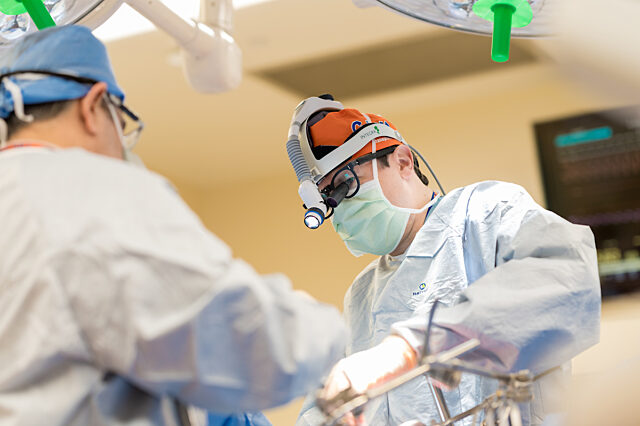UF Health liver transplant program outcomes reach No. 1 in nation

It’s in the organ’s name — you can’t live without a liver.
For patients in need of a liver transplant — whether it be from acute or chronic liver failure, cancer, or metabolic diseases — a transplant can mean the difference between life and death. Now, UF Health Shands Hospital is the only program in the country to reach 14 out of 15 possible bars in SRTR’s five-tier outcome system, according to the Scientific Registry of Transplant Recipients’ (SRTR) January 2022 report.
For liver transplant candidates, getting a transplant fast has a significant impact on survival, and evaluations show that UF Health’s program is more than up to speed.
“When the liver begins failing, you are racing against time,” said Thiago Beduschi, M.D., director of the abdominal transplant program and chief of transplantation and hepatobiliary surgery at UF Health Shands. “And having a skilled team that can perform any transplant under the most challenging conditions and against all the odds is a team that can give a patient a better chance.”
Under Beduschi’s guidance, the abdominal transplant program has become one of the busiest programs in the country. According to the report, 98.8% of patients have functional grafts at the one-year mark, a key milestone. Notably, Beduschi and his team take some of the most acute cases, often transferred from other transplant facilities, and those whose prognoses are poor — such as patients already in the ICU and on life support.
Despite that, the mortality rate for individuals waiting on a liver transplant at UF Health is among the lowest of all transplant centers in the nation. The center also boasts the highest volume of adult deceased donor liver transplants in the Southeast, according to the latest OPTN (Organ Procurement and Transplantation Network) report.
To date, UF Health has performed more than 2,000 liver transplants and despite the pandemic, Beduschi has grown the program to be the leading center in Florida.
“It’s an honor to see our liver transplant program, which was one of the first liver transplant programs in the state of Florida continue to lead in patient outcomes,” said Ed Jimenez, CEO of UF Health Shands. “Our physicians leverage advanced techniques and a dedication to research to give patients and their families a chance for a better tomorrow.”
In 2021, UF Health Shands performed 452 organ transplants, a new record for the institution. Key to the liver program’s success — and those of other transplant programs — is its focus on the patients and the UF multidisciplinary approach, which draws on the combined expertise of transplant physicians, transplant surgeons, nurse coordinators, transplant assistants, social workers, financial counselors, transplant pharmacists, anesthesiologists, intensivists and psychologists.
“You get to good outcomes by concentrating in the patients and their family’s needs first,” Beduschi said. “If you do that, the rest is a natural consequence. We are a program that cares about people. This mission drives my team, and I am proud of that.”
Media contact: Ken Garcia at kdgarcia@ufl.edu or 352-265-9408